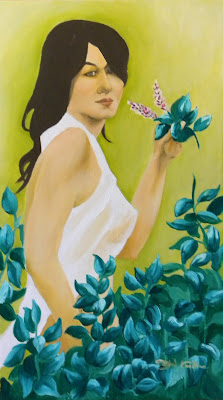
oil on canvas (50 x 70 cm.)
PRIVATE COLLECTION
LOTIS was a Naiad Nymph of the springs of the River Sperkheios on Mount Othrys in Malis, northern Greece. She metamorphosed into a lotus flower in order to escape the pursuit of the god Priapos.
"You were holding, Greece, the feast of grape-crowned Bacchus [Dionysos], celebrated by custom each third winter. The gods who serve Lyaeus [Dionysos] also attended and whoever is not hostile to play, namely Panes and young Satyri and goddesses who haunt streams and lonely wilds [Naiades and Dryades]. Old Silenus came, too, on a sway-backed donkey, and the red-groined terror of timid birds [Priapos whose garden statue functioned as a scarecrow].
They discovered a grove suitable for party pleasures and sprawled on grass-lined couches. Liber [Dionysos] supplied wine, they had brought their own garlands, a brook gave water for frugal mixing. Naiades were there, some with hair flowing uncombed, others with locks artfully coiffured . . . Some generate tender fires inside the Satyri, others in you, whose brow is bound with pine [Pan]. They inflame you, too, Silenus; your lust can't be quenched, lechery will not allow you to be old. But red Priapus, the garden's glory and protection, fell victim above all to Lotis.
He desires her, he wants her, he sighs for her alone; he nods at her and pesters her with signs. Disdain defines the pretty, beauty is trailed by pride: she teases and scorns him with her looks. It was night. Wine induced slumber and prone bodies lay everywhere, conquered by sleep. Lotis rested furthest away, tired from partying, in the grass beneath some maple branches. Her lover rises and, holding his breath, tracks secretly and silently on tiptoe. When he had reached the snow-white Nympha's secluded bed, he took care his breathing was soundless. And now he was poised on the grass right next to her, and still she was filled with a mighty sleep. His joy soars; he draws the cover from her feet and starts the happy road to his desires.
Then look, the donkey, Silenus' mount, brays loudly, and emits untimely blasts from its throat. The terrified Nympha leaps up, fends Priapus off, and awakens the whole grove with her flight. And the god, whose obscene part was far too ready, was ridiculed by all in the moon's light. The author of the clamour was punished with death. He’s a victim dear to Hellespont’s god." Ovid, Fasti 1. 391 ff (trans.Boyle) (Roman poetry C1st B.C. to C1st A.D.) :
"There is a lake [in Oikhalia] whose shelving sides had shaped a sloping shore, and myrtles crowned the ridge. There Dryope had come, not dreaming of fate's design, and, what must make you more indignant, bringing garlands for the Nymphae . . . Near the lakeside was a water-lotus flowered, its crimson blooms like Tyrian dye, fair hope of fruit to come. Dryope picked a posy of these flowers to please her boy. I [Iole] meant to do the same (for I was there), when I saw drops of blood drip from the blossoms of the boughs shiver in horror. For this shrub, you see (too late the peasants told us), was the Nymphe Lotis who fled Priapus's lechery and found changed features there but kept her name. Nothing of this my sister knew. She'd said prayers to the Nymphae and now in terror tried to turn away and leave, but found her feet rooted. She fought to free herself, but failed to move below her bosom. Gradually up from the soil right round her legs and loins bark climbed and clung; and, seeing it, she tried to tear her hair, but found leaves filled her hand, leaves covered her whole head [she was transformed into a tree]." Ovid, Metamorphoses 9. 334 ff (trans. Melville) (Roman epic C1st B.C. to C1st A.D.) :
source: http://www.theoi.com











